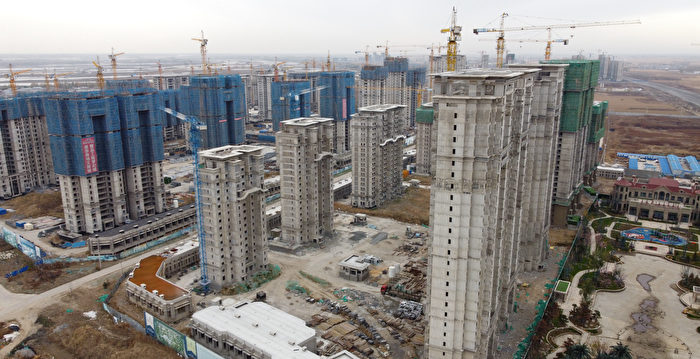[The Epoch Times, July 28, 2022](The Epoch Times reporter Wu Wei compiled and reported) On Wednesday (July 27), according to the latest estimates from S&P Global Ratings, real estate sales in mainland China will plummet this year, and the decline will be above levels during the 2008 financial crisis.
Real estate sales across China are likely to fall by about 30% this year, nearly twice as bad as previously forecast, the rating agency said, citing an increasing number of Chinese homebuyers suspending mortgage payments.
Such a drop would be worse than in 2008, when sales fell roughly 20%, Esther Liu, a director at S&P Global Ratings, said in a phone interview with CNBC on Wednesday.
Since the end of June, unofficial Communist Party statistics have shown a rapid increase in Chinese homebuyers refusing to pay their mortgages among hundreds of unfinished projects.
Most homes in mainland China are sold before completion, creating an important source of cash flow for developers. Over the past two years, the real estate companies have struggled to secure new financing as the Chinese government reined in and cracked down on their high reliance on debt growth.
Now, a “tire of loans” by owners of unfinished properties is causing people to lose confidence in the real estate market, delaying the “recovery” of China’s real estate industry until next year instead of this year, Liu said.
With property sales falling, more developers could be in financial distress, she said, warning that “if the situation is not contained, the drag could even spill over to other developers who are operating in a relatively healthy way.”
There’s also the potential for social unrest if buyers don’t get the apartments they paid for, Liu said.
In a separate note on Tuesday, S&P estimated the “loan suspension” could affect 974 billion yuan ($144.04 billion) of such loans, or 2.5 percent of China’s overall home loan portfolio, or 0.5 percent of total loans.
Liu said they could not predict the impact on China’s GDP of the “borrowing wave”.
China’s real estate industry has been intertwined with local governments and land-use policies, making it difficult to quickly resolve the industry’s problems.
In an analysis published on Tuesday, Xu Gao, director of the China Chief Economist Forum, pointed out that since 2005, the area of residential buildings completed each year has actually not increased, while the area of land sold during this period has decreased.
The contraction, he said, contrasted sharply with the rapid growth in land sales and completed dwellings prior to 2005. In August 2004, new land bidding regulations came into full effect, which effectively tightened the supply of land, thereby driving up housing prices.
“For us, the ongoing pressure on China’s real estate sector, coupled with uncertainty related to the containment measures, points to an even more uncertain outlook for the Chinese economy,” wrote credit strategist Kenneth Ho.
His prediction for the future is that fears of a credit explosion remain high, but there is no real crisis of the entire financial system collapsing, negatively affecting investor sentiment in the high-yield credit market.
Responsible editor: Lin Yan#
